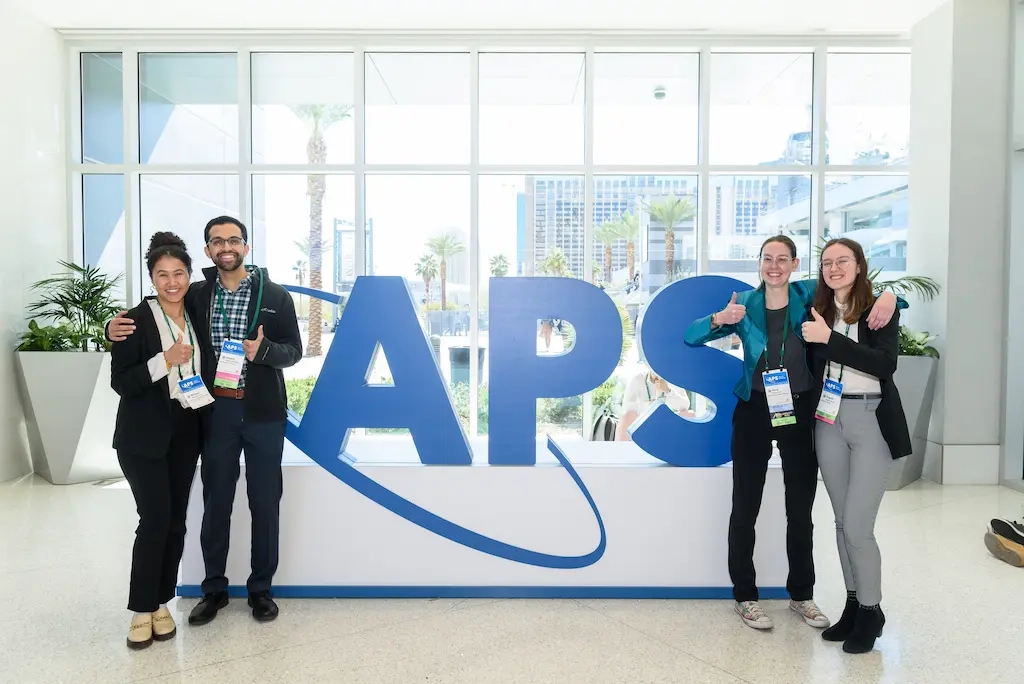In early March, several members of the Quantum Science Group descended on Las Vegas for the APS March Meeting – an annual conference that brings together over 10,000 physicists from around the globe. Among those attending were Dr Abhijeet Alase and Dr Salini Karuvade, who agreed to share their reflections on the conference. Here’s what they had to say…

Why did you attend the APS March Meeting? What were you hoping to get out of it?
Currently there is a lot of activity in the field of quantum technologies worldwide. Attending the APS March Meeting 2023 was a great way to catch up with the advances in the field and to interact with counterparts from other universities and indeed other countries. We wanted to meet our colleagues and collaborators in USA and Canada and wanted to make new connections that could transform into meaningful collaborations in the future. Most importantly, we wanted to present our research works and hear from other researchers what they find exciting in their fields. We are very happy to have achieved all of these goals!
What presentation/talk did you enjoy the most and why?
There were many intellectually stimulating sessions, so it is hard to pick! We certainly enjoyed Prof. John Preskill’s keynote talk on shadow tomography. It made us realize how well classical machine learning techniques can be utilized for learning large quantum systems. There were also some mind-blowing experimental advances on quantum error correction presented in the conference. One of the talks that saw a huge participation was by a team from IBM, who showcased their results on mid-circuit measurement. These advances certainly take us closer to realizing fault-tolerant quantum computers.
What was your favourite breakout activity/workshop and why?
Our favourite activity/event was actually not scheduled by the organizers of the conference, but initiated by some of the conference participants. Professors from various universities in India organised a Q+A on the subject of joining academia in India – something that Salini and I (Abhijeet) have entertained for our futures. It was a great opportunity to meet several new faculty members from India and other early-career researchers, and we greatly enjoyed the event.
What was a key-take away from the conference?
The key take-away for us, in terms of research, was that a very large community of physicists, computer scientists and engineers is devoted to the development of fault-tolerant quantum computers, and they will be focusing on quantum error correction in the coming years. This is very reassuring for us and our peers in the Quantum Theory Group at the University of Sydney, which is currently led by Prof. Stephen Bartlett and Prof. Andrew Doherty and among the best groups globally in this field.
I understand that you continued on to California after the APS Conference. Can you tell me more about that leg of your work trip?
The easiest way to return from Las Vegas, where the APS March Meeting 2023 was held, is via Los Angeles, California. California also has several universities where great quantum science happens, so we decided to extend our stay and met with various researchers at Caltech, UCLA and UCSD to discuss potential collaborations. Unfortunately for us, many people have chosen to work from home post COVID which limited our opportunities to organically connect with potential collaborators, but it was still a fruitful endeavour. Another reason we visited California was for its entrepreneurial culture – it’s no coincidence that start-ups in the quantum science field are headquartered there.
What are some of the benefits of visiting and collaborating with other researchers overseas?
Forming overseas collaborations is one way of utilizing the strength of diversity for research. Best science results from the merger of such diverse ideas. Researchers in Australia and abroad, while working on the exact same research problem, often have an entirely different perspective on solving it. Internalising such different viewpoints greatly enhances our understanding and allows rapid progress on research questions. Additionally, overseas visits are greatly useful for early-career researchers as they create opportunities for jobs and winning research grants.
What is the next conference that you are planning to attend?
This is the third conference we attended in the past two months, so we are in fact hoping to refocus on our respective projects. That being said, we are looking forward to attending the 6th International Quantum Error Correction to be held in Sydney in Oct-Nov 2023. Also, the quantum science community in Australia is very well-connected and active, so we won’t be surprised if other exciting events come up well before October!
Final thoughts?
It was a privilege to be able to travel to USA and participate in the APS March Meeting 2023. This was made possible by the generous financial support provided by the Quantum Theory Group at the University of Sydney.

